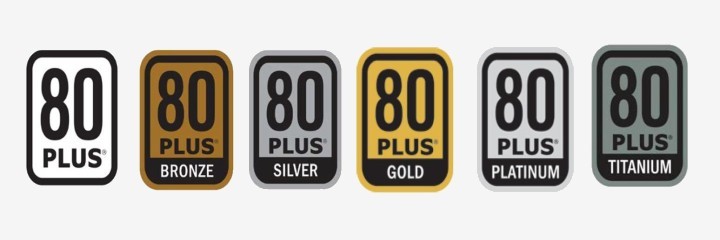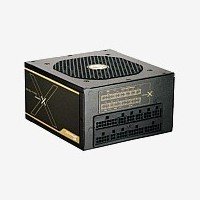Should You Buy a 80 Plus Power Supply?
What is a 80 plus power supply and should you get one for your computer? Get the full answers here with our complete power supply efficiency guide.
If you have been shopping around for computer power supplies, chances are you would have spotted a few "80 plus" badges proudly displayed on some retail boxes (see image below):
So what's the deal with this label and how does it affect you as a regular consumer? Let's find out the answer together...
What is a 80 Plus Certified Power Supply?
A 80 Plus power supply is one that has been tested and certified by Ecova to be least 80% energy efficient.
How do computer power supplies earn their 80 Plus certification?
- Power supply manufacturers (e.g. Antec, Coolermaster, Corsair, Seasonic)
send samples of their power supplies to Ecova for testing. Ecova
charges the manufacturers a fee for this testing and certification
process.
- Ecova will test the power supplies at 20%, 50% and 100% load. For a
1,000 watt power supply unit, this means drawing 200, 500 and 1,000
watts of power from it and measuring its efficiency at these three levels.
- If the test unit is able to achieve a power supply efficiency of at least 80% at all three load levels, then it is certified as 80 Plus. Depending on its overall efficiency, Ecova will award it with a 80 Plus standard, bronze, silver, gold, platinum or titanium certification.
A power supply has to meet the minimum efficiency levels below to earn itself a 80 Plus badge:

|
|
EFFICIENCY |
| |
|
80 Plus |
80% |
80% |
80% |
|
80 Plus Bronze |
82% |
85% |
82% |
|
80 Plus Silver |
85% |
88% |
85% |
|
80 Plus Gold |
87% |
90% |
87% |
|
80 Plus Platinum |
90% |
92% |
89% |
Ecova has a separate set of criteria and ratings for redundant (enterprise) power supplies, but we're leaving them out of this discussion since it doesn't apply to consumers in general.
Should You Buy a 80 Plus Power Supply?
Recommended Power Supplies
Budget Computer:
EVGA 500 BR 80+ Bronze 500W
Mid Range Computer:
Cooler Master MWE 550 Gold 550W
Gaming Computer:
Corsair RM850x 80+ Gold 850W
Home Theater PC:
Seasonic Focus SGX-500 80+ Gold 500W
Click here for our buyer's guide to the best computer power supplies.
The short answer: Yes, you should buy a 80 Plus power supply unit. To be more precise, you should go for a high efficiency power supply unit. We have good reasons for making this recommendation:
1. 80 Plus power supplies help you cut down on electricity costs
A 80 Plus
power supply may cost more than a generic unit, but it's going to pay
for itself in term of power cost savings.
To illustrate our
point,
let's take a look at this example: Suppose we have two different power
supply units: a generic unit with 70% efficiency and a 80 Plus Gold unit
with 90% efficiency.
If
you install them in a computer that draws 200 watts of power, the
generic unit will pull 286 watts from the wall socket (the additional 86
watts are wasted as heat). The 80 Gold Plus unit will just pull 222
watts, resulting in a power savings of 64 watts.
Assuming that the
computer runs for 10 hours daily and electricity costs $0.25 per
kWh,
Annual Costs Savings
= power savings in kW x usage hours per year x cost per kWh
= (64/1000) x (10 x 365) x 0.25
= $58.40
High quality power supplies are expected to last for at least 3 years, so that's more than $175 in savings over its lifespan.
2. 80 Plus power supplies tend to run cooler and quieter
As we already know, efficient power supplies generate less heat. Since the power supply fan doesn't have to spin as fast to keep temperatures low, it ends up producing less noise as well.
3. 80 Plus power supplies tend to have higher build qualities
Since 80 Plus power supplies require higher quality components and more sophisticated manufacturing, they tend to have better build qualities than low efficiency power supplies. Having passed 80 Plus testing also indicates that the power supply was able to deliver its full rated wattage, which is another quality indicator.
"Should I splurge on a 80 Plus Platinum power supply or is 80 Plus good enough?"
The answer will depend on your power usage pattern. The more power-hungry your computer is and the longer you leave it running, the higher your power supply efficiency should be.
For example, a 100 watt family computer that is used for four hours daily will do just fine with a 80 Plus power supply... while a 1,000 watt server running 24/7 should be paired with a 80 Plus Gold or Platinum unit for maximum cost savings.
Shortcomings of the 80 Plus Program
While the 80 Plus program has been invaluable in promoting the awareness and importance of high efficiency power supplies, its testing procedure does leave something to be desired:
- Only one power supply sample is being tested, and the manufacturer gets to
select that sample unit. A fairer method would be to test multiple
random units taken off retail shelves instead of a single unit picked by
the manufacturer.
- 80 Plus testing is carried out at 23 °C (73.4 °F). This is unrealistic
since the temperature inside most computers hover between 40 to 50 °C
(104 to 122 °F). This matters because power supply efficiency tends to
increase at lower temperatures, resulting in artificially higher
efficiency percentages during 80 Plus testing.
- Some dishonest manufacturers have been caught labeling their power supplies as 80 Plus even though they were not tested and certified by Ecova.
Fortunately this last issue can be easily resolved - Before buying a 80 Plus power supply, make sure that it is listed on the official 80 Plus website.
SEE ALSO: Recommended Computer Power Supplies
POWER SUPPLY GUIDE
- Introduction to Power Supplies for Computers
- Recommended Computer Power Supplies
- Desktop PC Power Requirements
- Power Consumption of PC Components
- Should You Buy a 80 Plus Power Supply?
- What is a Modular Power Supply?
- Should You Buy a Regular or Modular PSU?
- How to Install a Power Supply Unit
- How to Connect Power Supply Connectors

